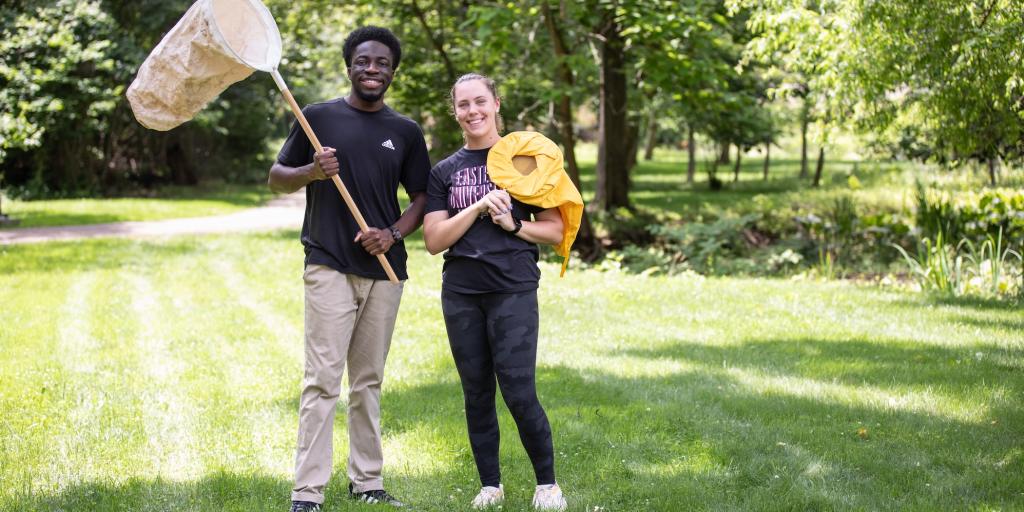

Why Major in Environmental Science?
The BS in Environmental Science at Eastern University prepares students to understand both the language of Biology and Ecology, and the language of environmental law and regulations. Students take upper-level biology courses in Ecology, Environmental Issues, Environmental Regulation and Policy, Geology, and at least two field biology electives courses along with two chemistry courses and elective courses in economics, political science, and mathematics. Field biology electives are offered at Eastern; however, students are also encouraged to take their field courses at Au Sable Institute for Environmental Studies, which is a full-time summer field course program.
This major helps prepare students for environmental research or consulting, environmental education, graduate studies related to ecology and conservation, policy work at a variety of levels, and law school, particularly for environmental law.
Why Choose Eastern?
- Personalized teaching: Our largest classes (60-80 students) are our two introductory courses. Otherwise, upper level courses have approximately 20 students or less. Senior research and thesis classes are limited to 5 students. Students can have extensive faculty contact both during and outside of classes and have diverse course offerings each semester
- Faculty research and service: Students can receive credit in directed research projects working with professors in their area of expertise.
- Christian faith integration: We seek to integrate a Christian worldview with our study of biology. We seek to integrate a Christian worldview - truth God has revealed in the Bible - with our study of the measurable. This includes wrestling with the best responses to new knowledge and technologies, whether issues of global climate change, applications of genetics or issues surrounding evolution.
- Labs and student research: Besides standard field biology equipment, we have electronic resources such as a GIS site license for ecosystem mapping and analysis from GPS. Our 100 acre St. Davids campus offers forests and wetlands that extend our on-campus lab space. Students also have access to laminar flow hoods for cell culture; fluorescent microscopes; thermal cyclers for PCR (polymerase chain reaction); and other tools for DNA and protein electrophoresis. Experience with these research tools have prepared students well for employment or graduate school following graduation.
- Field biology labs and proximity to diverse ecosystems: A strength of our program is extensive field time in our environmental-related courses at numerous off-campus locations. Eastern is within two hours of Atlantic Ocean barrier islands, salt marshes and bird migration stopovers; the biologically unique New Jersey Pine Barrens; the Appalachian Mountains, and the Pocono Plateau, which includes glacial bogs. Our immediate Philadelphia area includes serpentine barrens, five biogeographical zones and the John Heinz Refuge at Tinicum freshwater tidal marsh. Field trips built into our courses allow students to directly observe and study these and other ecosystems.
- International programs (Spanish and Biology): Students with Spanish proficiency equivalent to two years of college Spanish or more can study abroad at Universidad de las Americas in Puebla, Mexico, one of the best schools in Latin America for laboratory biology, chemistry and medicine. Students interested in ecology and tropical biology can study abroad in the Quetzal Education and Research Center (QERC) in Costa Rica.
- International programs and the Creation Care study program: Eastern helped found this program, offering study abroad Fall or Spring semesters in Belize, New Zealand or British Columbia. Courses, all built around the theme of environmental sustainability, fulfill core requirements in Humanities and Social Sciences for science majors, as well as providing a field biology elective. Internships are available in Belize.
- Off-campus programs for biology: the Au Sable Institute: More than 50 Christian colleges and universities partner to offer field courses in May and Summer I and II, in northern Michigan, Whidbey Island in Puget Sound (Washington State), Costa Rica, and India. Courses taken at Au Sable are directly credited through Eastern. Learn more about courses offered and how you can graduate in 3.5 years with this program.


